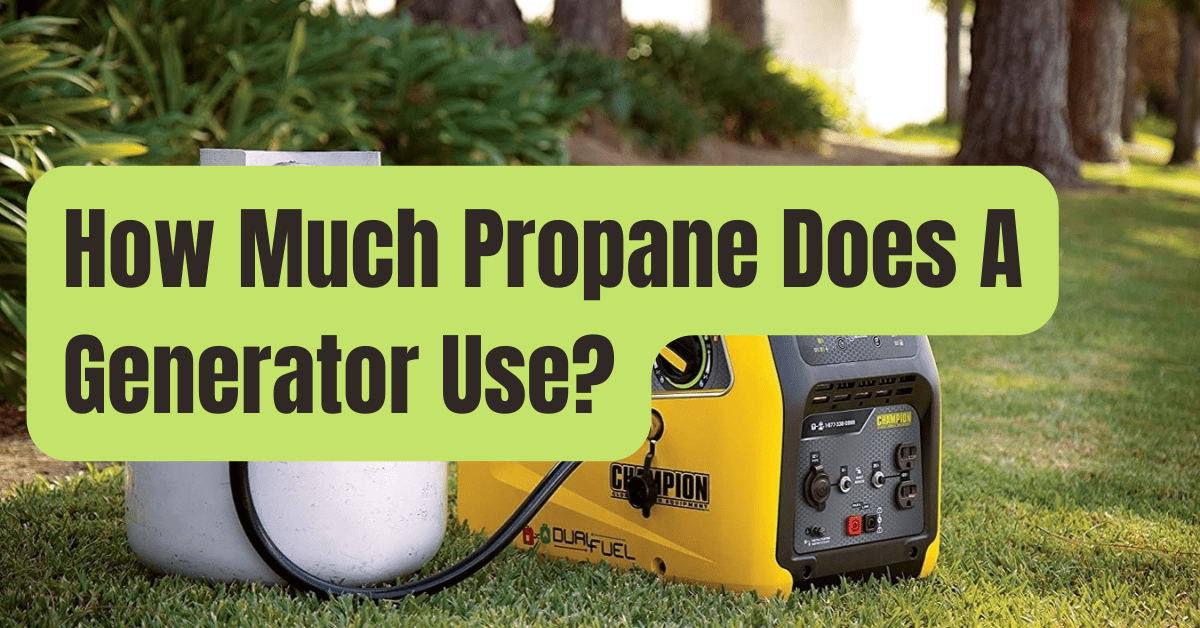Propane generators may be hooked up to either a portable 20-pound propane tank or a huge in-ground propane tank that you keep topped up at your home.
Because fuel may be scarce in an emergency or catastrophe, it’s a good idea to calculate how much propane your generator would consume to figure out how much you’ll need to stockpile.
The amount of fuel your generator consumes is determined by the following factors:
- The generator’s load (or how much electricity you’re pulling from it)
- The efficiency of the generator model
- How long are you going to run it for each day?
Calculation Made Easy
Calculate how much propane your generator uses per hour to determine how much propane you’ll need to store.
Then multiply that by the number of hours you plan to use it for, plus a little extra for safety.
Total propane = propane use per hour x hours + contingency
Calculating the Propane Consumption of a Generator Per Hour
We’ll need to do some math to figure out how much propane your generator will consume every hour…
For our calculations, we’ll need some fundamental assumptions regarding a typical generator’s efficiency:
A two-horsepower generator will typically provide about 1000 watts of electricity.
10,000 BTU per hour of fuel is required to create 1 horsepower of mechanical energy.
Propane has a 92,000 BTU per gallon fuel value.
Propane has a gallon weight of 4.2 pounds.
Step 1
To begin, we’ll need to figure out how much horsepower we’re using:
Horsepower = (watts / 1000) x 2
For example, a 3000-watt base load would need 6 horsepower.
Step 2
The next step is to figure out how that connects to BTU.
BTU = horsepower x 10,000
In our example, the 3000-watt load would burn 60,000 BTU per hour of fuel.
Step 3
Finally, you can figure out how much propane this is.
Gallons of propane = BTU / 92000
As a result, operating a generator with a 3000-watt load for an hour would use 0.65 gallons of propane (60,000/92,000).
Putting Everything Together
These computations may be combined to generate a single equation:
Propane used per hour (gallons) = (watts/3000) * 0.65
The weight of 0.65 gallons of propane is 2.73 pounds.
As a result, a 20-pound propane cylinder holds 20/2.73 x 0.65 = 4.76 gallons.
You could operate a 3000-watt load for around 7 hours on your generator.
Keep in mind that these figures are just estimates and do not account for differences in generator efficiency.
However, it’s a good place to start when figuring out how much propane your generator will require.
Always err on the side of caution; it’s preferable to have some extra gasoline than to run out.
Tanks vs. Cylinders
Most portable generators use a 20-pound propane cylinder, which stores 4.7 gallons of propane when fully charged.
As you can see from the numbers above, one cylinder is unlikely to power your home for more than a day unless you’re very frugal with your energy use.
You’ll need many cylinders or an in-situ propane tank if you wish to utilize a propane generator to power your house for several days.
Remember that connecting to a huge tank is more difficult than connecting to a portable cylinder system, and you’ll still need to shut down the generator for maintenance.
If you don’t use your generator twenty-four hours a day, you’ll help it last longer.
Calculation that is more realistic
The electricity you’re getting from the generator may not be continuous in reality.
You may have a base load of the refrigerator, freezer, and sump pump in the morning, but a larger load in the evening when you use the microwave, turn on the lights, and wash the clothes.
You could include this to your contingency plan, but it’ll be more accurate to calculate the amount of propane you’ll need during base load and peak hours separately, then combine the two values together.
As a result, you may do the following calculation:
Total propane = (propane use per hour base load x hours) + (propane use per hour peak load x hours) + contingency
Calculation Example
Here’s an example of how this calculation may work if you’re hoping to produce enough electricity to be self-sufficient for a three-day power outage using our top-rated propane generator, Champion Power Equipment 100165.
#1. Loading Base
A refrigerator/freezer (700 watts), a deep freezer (500 watts), a computer and monitor (800 watts), a security system (500 watts), and a one-third horsepower sump pump make up our basic load in this scenario (800 watts).
Our 3300 watt base load will operate for three days at 14 hours each day.
The propane required for 3300 output is 0.72 gallons per hour, according to our calculation.
Total propane = 0.72 x (14 x 3) = 30.24 gallons
#2. Maximum Load
We also want to be able to power lights in the home (6 x 60 watts), an electric stove (2100 watts), and a television (500 watts) for three hours during the evening during this 14-hour “base load.” We’ll operate a washing machine load (1150 watts) for two hours and an electric water heater for an hour (4000 watts) during the daytime during the power outage.
As a result, we have three peak loads:
Evening peak load = base load + 2960 watts = 3300 + 2960 = 6260 watts
Additional fuel consumption (over base load) = 2960 /3300 * 0.72 = 0.64 gallons /hr
Washing machine load = base load + 1150 watts = 3300 + 1150 = 4450 watts
Additional fuel consumption (over base load) = 1150 /3300 * 0.72 = 0.25 gallons /hr
Water heater load = base load – computer* + 4000 watts = 3300 – 800 + 4000 = 6500 watts
Additional fuel consumption (over base load) = 3200 /3300 * 0.72 = 0.70 gallons /hr
*To keep below the generator’s continuous load limit, we’re thinking the computer would be switched off while the heater is on.
The following are our estimations for the quantity of propane required for these peak hours over three days:-
Evening peak load: 0.64 x (3 x 3) = 5.76 gallons propane
Washing machine load: 0.25 x (2 x 1) = 0.5 gallons propane
Water heater load: 0.70 x (1 x 1) = 0.7 gallons propane
#3. Total Propane Consumption
Simply mix the amounts together and add a contingency to get your overall propane demand.
We’ve opted to add a half-(7-hour) day’s base load in this case.
This provides for a higher power consumption when appliances are first turned on, as well as any minor additional things we may wish to utilize.
Total propane required = base load + evening peak load + washing machine load + water heater load + contingency
Total propane = 30.24 + 5.76 + 0.5 + 0.7 + 5.04 = 42.24 gallons
A Final Thought
Even if you can’t store enough propane at home, the calculations are still worthwhile.
The exercise will give you a realistic estimate of how much gasoline you’ll need in an emergency and if you’ll need to cut down on your generator usage to extend your fuel supply.
If you haven’t yet purchased a generator, have a look at our complete list of the best propane generators, as well as our generator calculator, which can assist you in determining the proper size generator for your requirements.










